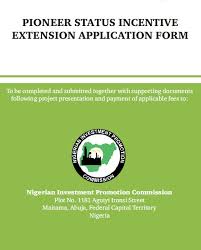The Pioneer Status Incentive (PSI) is a tax relief initiative by the Nigerian Investment Promotion Commission (NIPC) designed to stimulate investment in sectors critical to Nigeria’s economic development. Companies granted pioneer status enjoy a tax holiday, exempting them from paying company income tax for an initial period of three years, with the possibility of extension for one or two additional years.
This guide provides a detailed, step-by-step process for obtaining PSI, including eligibility criteria, application procedures, associated costs, and answers to frequently asked questions.
Table of Contents
1. What is the Pioneer Status Incentive (PSI)?
The PSI is a tax holiday granted to companies operating in industries or producing products designated as “pioneer” by the Nigerian government. The incentive aims to encourage investment in sectors that are underdeveloped or critical to the nation’s economic growth. Beneficiaries are exempted from paying company income tax for an initial period of three years, which can be extended for one or two additional years.
2. Eligibility Criteria
To qualify for the PSI, a company must:
-
Operate in a Pioneer Industry: Engage in activities listed as pioneer industries or products by the NIPC.
-
Capital Expenditure: Have incurred capital expenditure of not less than ₦10 million.
-
Regulatory Compliance: Possess the relevant regulatory licenses to operate in its sector.
-
Application Timing: Submit the application within the first year of production or service.
3. Step-by-Step Application Process
Step 1: Preliminary Assessment
-
Determine Eligibility: Ensure your company’s activities are listed among the pioneer industries or products.
-
Prepare Documentation: Gather necessary documents, including business plans, financial projections, and regulatory licenses.
Step 2: Submission of Part I Application
-
Application Letter: Write a formal application letter to the Executive Secretary of the NIPC.
-
Application Form: Complete and submit Part I of the PSI application form along with supporting documents.
-
Payment of Fees: Pay the application fee, due diligence fee, and service charge deposit.
Step 3: NIPC Review and Site Inspection
-
Review Process: The NIPC reviews the application and conducts a site inspection to verify the information provided.
-
Approval in Principle: If satisfied, the NIPC issues an Approval in Principle.
Step 4: Submission of Part II Application
-
Industrial Inspectorate Department (IID): Submit Part II of the application to the IID of the Federal Ministry of Industry, Trade, and Investment.
-
Production Day Certificate: The IID determines the production day and issues a certificate accordingly.
Step 5: Issuance of Pioneer Certificate
-
Final Approval: Upon receipt of the Production Day Certificate, the NIPC issues the Pioneer Status Incentive Certificate, marking the commencement of the tax holiday.
4. Required Documentation
Part I Submission to NIPC
-
Formal application letter to the Executive Secretary of NIPC.
-
Completed Part I application form.
-
Company’s certificate of incorporation.
-
Memorandum and Articles of Association.
-
Detailed business plan and financial projections.
-
Evidence of capital expenditure.
-
Regulatory licenses.
Part II Submission to IID
-
Formal application letter to the Director of IID.
-
Completed Part II application form.
-
Production records.
-
Sales and revenue records for the past seven months.
-
Environmental Impact Assessment report.
-
List of machinery and equipment.
5. Costs and Fees
| Fee Description | Amount (₦) |
|---|---|
| Application Fee | 500,000 |
| Due Diligence Fee | 1,000,000 |
| Service Charge Deposit | 3,000,000 |
| Annual Service Charge | 1.5% of pioneer profits |
| Extension Application Fee | 250,000 |
| Penalty for Non-Compliance (New) | 200,000 |
| Penalty for Non-Compliance (Extension) | 100,000 |
Note: Fees are subject to change; always refer to the NIPC official website for the most current information.
6. Processing Timeline
The entire process of obtaining the Pioneer Status Incentive typically takes about 25 weeks:
-
NIPC Processing: 18 weeks for application review and site inspection.
-
IID Processing: 7 weeks for determining the production day and issuing the certificate.
7. Compliance and Reporting Obligations
-
Annual Performance Report: Beneficiaries must submit an annual performance report to the NIPC by June 30 of the following year.
-
Non-Compliance Penalties: Failure to submit the report may result in the cancellation of the PSI certificate and notification to the Federal Inland Revenue Service (FIRS) for tax collection.
8. Frequently Asked Questions (FAQs)
Q1: Can an existing company apply for PSI?
Yes, existing companies can apply for PSI if they are expanding into a pioneer industry or product.
Q2: Is the PSI applicable to all industries?
No, only industries and products listed as pioneer by the NIPC are eligible.
Q3: Can the tax holiday be extended beyond three years?
Yes, the initial three-year tax holiday can be extended for one or two additional years upon application.
Q4: What happens if I fail to submit the annual performance report?
Failure to submit the report can lead to the cancellation of your PSI certificate and possible tax liabilities.
9. Common Misconceptions
-
Misconception 1: PSI is only for foreign companies.
Correction: Both foreign and indigenous companies can apply for PSI, provided they meet the eligibility criteria. -
Misconception 2: Once granted, the tax holiday is indefinite.
Correction: The tax holiday is for an initial period of three years, with a possible extension for one or two additional years. -
Misconception 3: All business activities qualify for PSI.
Correction: Only activities listed as pioneer industries or products by the NIPC are eligible.
10. Conclusion
The Pioneer Status Incentive offers significant tax relief benefits to companies operating in designated pioneer industries in Nigeria. By following the outlined steps and ensuring compliance with all requirements, eligible companies can successfully obtain and benefit from the PSI. Always consult the NIPC official website or contact their offices for the most current information and guidance.


